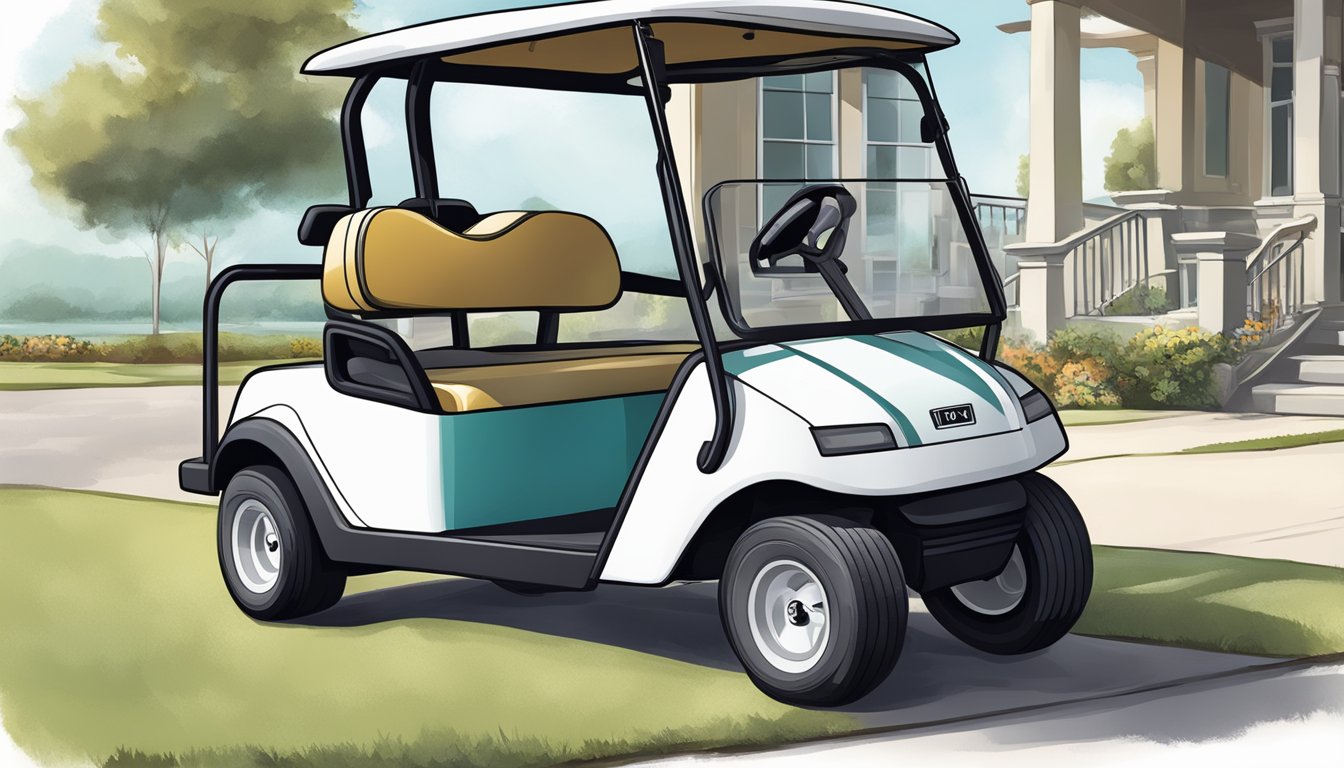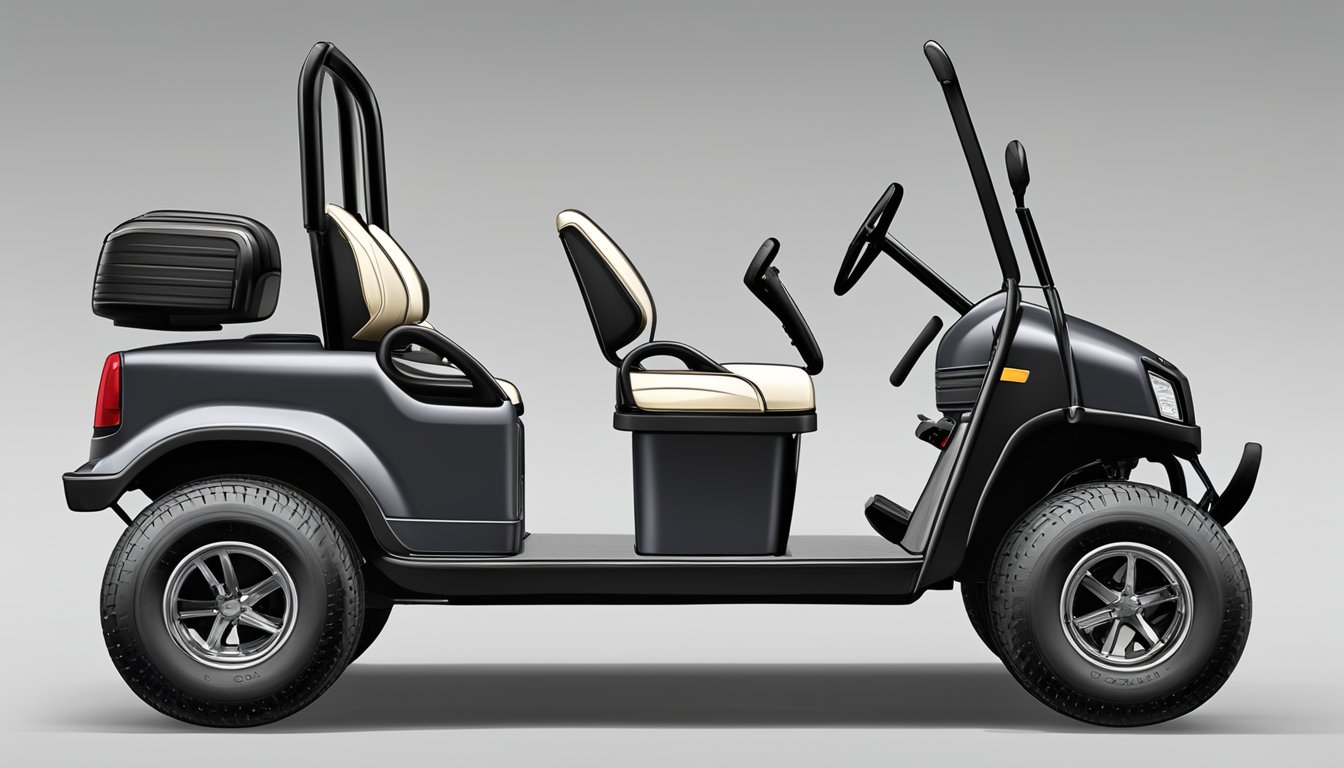Golf carts, while similar to other vehicles in many ways, have unique characteristics that set them apart. One such distinction revolves around Vehicle Identification Numbers (VINs), which are commonly used to track and identify automobiles on the road. The question of whether golf carts have VINs or not is a topic that has garnered much curiosity among golf cart owners and enthusiasts.

In general, standard golf carts do not have VIN numbers, as these are intended for road vehicles. However, some custom golf carts that are considered street-legal may require a VIN number to be registered and licensed at the state level. This variation between regular and road-ready golf carts has led to some confusion about VIN numbers and their significance in the world of golf carts.
Key Takeaways
- Standard golf carts typically do not have VIN numbers, while street-legal ones may require them.
- VIN numbers are crucial in registering and licensing road-ready golf carts at the state level.
- Confusion persists within the golf cart community regarding the significance of VIN numbers.
Understanding VIN Numbers in Golf Carts
VIN numbers, also known as Vehicle Identification Numbers, are unique identifiers consisting of 17 characters that include both numbers and letters. These numbers serve as a “fingerprint” for vehicles, providing crucial information about the manufacturer, make, model, model year, and origin of the vehicle. They also aid in tracking vehicles for various purposes, including registration, insurance, and theft prevention.
In the context of golf carts, these vehicles do have unique identifiers similar to VIN numbers. While standard golf carts may not come with a traditional 17-character VIN, they usually have unique serial numbers assigned during manufacturing. These serial numbers serve a similar purpose, allowing for the identification of the golf cart make, model, and other relevant information about its features.
Manufacturers typically assign these unique serial numbers to golf carts, making it possible for owners and authorities to track and identify them in case of theft or for other administrative purposes. These serial numbers vary depending on the manufacturer and the specific model of the golf cart.
To locate the serial number on a golf cart, one would typically find it stamped on a metal plate or sticker. Common locations for serial numbers include the dashboard or beneath the driver’s seat. In some cases, the manufacturer may place the serial number on the frame, engine, or another visible part of the golf cart.
In summary, golf carts have unique identifiers called serial numbers, which serve a role similar to VIN numbers in traditional vehicles. These serial numbers provide necessary information about the golf cart’s manufacturer, make, and model, allowing for proper identification and tracking.
Legal Aspects of Golf Cart VIN Numbers
Golf carts, unlike regular vehicles, generally do not have a Vehicle Identification Number (VIN) but they do have unique serial numbers assigned by manufacturers. However, when it comes to registering and using golf carts on public roads, there will still be some legal aspects to consider.
When using golf carts on public roads, they need to be street-legal, meeting specific requirements. In many states within the United States, the Department of Motor Vehicles (DMV) regulates the registration process. Before getting your golf cart registered, it must comply with the safety and road use regulations set forth by the Department of Transportation (DOT). Some common requirements include headlights, taillights, brake lights, turn signals, seat belts, mirrors, and a horn. Speed limits could also differ depending on local laws.
To register a golf cart with the DMV, several documents are required such as proof of ownership, bill of sale, or proof of purchase. In some states, golf carts are classified as Neighborhood Electric Vehicles (NEVs) or Low-Speed Vehicles (LSVs) and will need a license plate. Keep in mind that registration requirements may vary from state to state.
Ensuring your golf cart has proper insurance coverage is another critical aspect, especially when involved in accidents on public roads. The insurance can cover property damage, bodily injury, and other claims that may arise. Having appropriate insurance can protect you from financial losses and provide peace of mind when operating your golf cart on public roads.
Theft prevention is another vital factor to consider in owning a street-legal golf cart. Though standard golf carts don’t come with VIN numbers, they do have unique serial numbers, which can be beneficial in identifying the golf cart in case of theft. By registering your golf cart and keeping track of its serial number, authorities can more effectively trace your golf cart in the event of theft, recovering it, and possibly preventing future occurrences.
In conclusion, when taking your golf cart on public roads, it’s essential to consider the legal aspects such as registration, insurance, safety, compliance with DOT regulations, and theft prevention measures to ensure a secure and pleasant driving experience.
Golf Cart VIN Numbers and Safety
Golf carts, initially designed for use on golf courses, have evolved into versatile vehicles that are used for various purposes both on and off golf courses. As these vehicles become more road-ready, safety concerns arise, and the importance of Vehicle Identification Numbers (VINs) become more apparent.
VINs are unique identifiers assigned to automobiles, allowing for tracking and verification of vehicle information. While standard golf carts don’t typically have VINs, they do possess unique serial numbers from the manufacturing process. However, road-ready and custom golf carts may require VINs for proper registration, inspection, and ensuring safety features are in place.
Safety upgrades are essential when preparing a golf cart for use on public roads. These upgrades may include installing headlights, taillights, brake lights, turn signals, and other necessary components such as windshield wipers and seat belts. Ensuring that these safety features are fully functional is vital not only to comply with legal requirements but also to protect the driver and passengers.
Regular maintenance and inspection of road-ready golf carts play an important role in keeping them in prime condition. The steering column, dashboard, and windshield should be routinely checked for defects or potential issues. Seat belts must be inspected and maintained to ensure they provide adequate protection in case of an accident.
When locating the serial number or VIN, it’s crucial to examine various areas of the golf cart. Common locations include the frame, close to the engine or under the dashboard, and the metal plate or sticker in the engine compartment. VINs are typically found in these areas, allowing for easy identification and verification of the golf cart make and model.
In conclusion, Golf cart VIN numbers play an essential role in ensuring safety and legality when using golf carts on public roads. Incorporating proper safety features, performing regular maintenance and inspections, and maintaining an accurate VIN help promote responsible and safe use of these versatile vehicles.
Golf Carts Manufacturers and VIN Numbers

When it comes to golf cart manufacturers, some of the leading names in the industry are Yamaha, Club Car, and EZGO. These manufacturers primarily produce golf carts for use on golf courses and private properties and, as a result, these carts often lack a Vehicle Identification Number (VIN) when they leave the factory. Instead, they come equipped with a manufacturer-specific serial number, which allows users to determine the vehicle’s model, year of manufacture, and factory location.
VINs are typically unique codes assigned to motor vehicles designed for public road use. For golf carts to be considered road vehicles or low-speed vehicles (LSVs) such as neighborhood electric vehicles, a VIN is required. Some states in the US require golf carts to be converted into street-legal vehicles, and obtaining a VIN becomes an essential step in the process.
The location of the serial number on a golf cart varies depending on the manufacturer. For instance, Yamaha golf carts may have their serial number stamped on the frame near the engine or under the dashboard, while Club Car carts typically have their serial numbers in the vehicle’s battery compartment. EZGO carts place their serial numbers in several locations, such as on the frame’s body or even under the driver’s seat.
A golf cart’s serial number can provide valuable information for various purposes, such as checking for theft, obtaining replacement parts, conducting repairs, and assessing the overall value and history of the cart. In some cases, a cart’s serial number may even be useful for determining whether it has been involved in any recalls. Mechanics can use this information to provide accurate repair estimates and ensure that they have the appropriate parts for a specific golf cart model and year.
In conclusion, while a majority of golf carts do not possess a VIN number, they do have a manufacturer-specific serial number that serves a similar purpose in tracking the cart’s history and identifying its key components. As the demand for street-legal golf carts and low-speed vehicles increases, VIN numbers will continue to play a vital role in registering and managing these unique vehicles.
Frequently Asked Questions
Where can I find the serial number on a golf cart?
The serial number on a golf cart can usually be found stamped on the frame or located near the engine or under the dashboard. In some cases, it might also be found on a metal plate in the engine compartment, usually on the driver’s side, near the firewall.
How do I identify my Yamaha golf cart’s VIN number?
To identify a Yamaha golf cart’s VIN number, look for the metal manufacturer’s plate on the firewall under the front cowl of the cart. The VIN will usually be a combination of letters and numbers, serving as a unique identifier for your golf cart.
Can I look up my Club Car golf cart’s serial number?
Yes, you can typically look up your Club Car golf cart’s serial number on the manufacturer’s website or by contacting Club Car Customer Support. The serial number will help you identify the make, model, and production year of your golf cart.
Where is the E-Z-GO golf cart VIN number located?
The VIN number for an E-Z-GO golf cart can usually be found on a metal plate under the driver’s side cup holder or on the frame beneath the passenger’s side seat. The VIN is a unique identifier for your E-Z-GO golf cart and can provide information about the make, model, and production year.
How can I obtain a VIN for my golf cart in North Carolina?
To obtain a VIN for your golf cart in North Carolina, contact the North Carolina Division of Motor Vehicles (DMV). They will provide you with the necessary forms and procedures to apply for a VIN. The VIN will be issued once the golf cart meets the required safety and equipment standards.
Are there identification numbers on Icon and Evolution golf carts?
Yes, like other golf cart manufacturers, Icon and Evolution golf carts also have identification numbers. These numbers typically serve as unique identifiers for your golf cart and can be found on metal plates or stamped onto the frame. The locations may vary, so it’s essential to consult your owner’s manual or contact the manufacturer for specific details.
